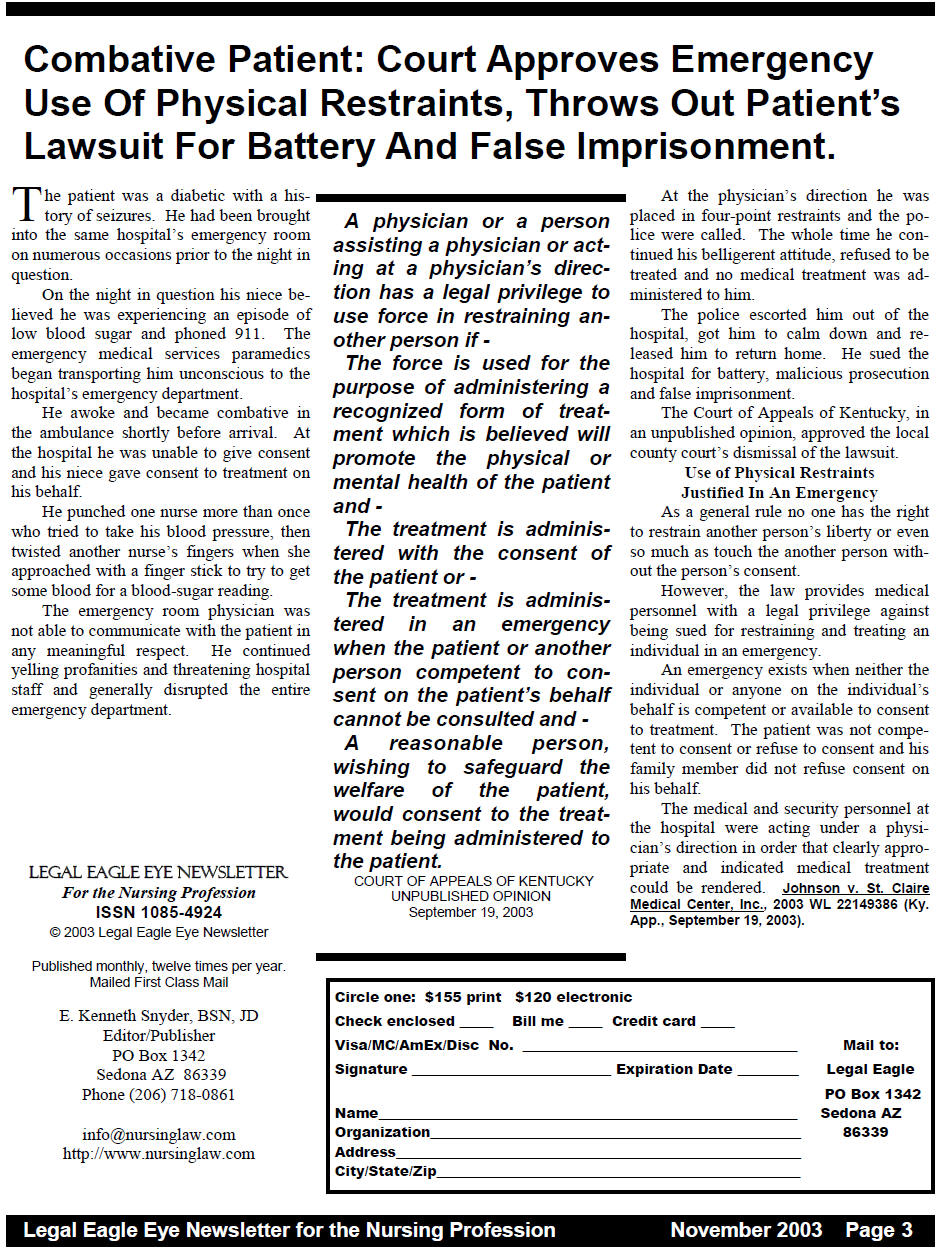
Legal Eagle Eye Newsletter for the Nursing Profession Home Page
New Subscriptions I About Our Newsletter I Sample Newsletter I FAQ I Contact Us

Restraint Of Combative Patient: Hospital Employee Who Acted Properly Was Improperly Fired.
The guard responded appropriately to a request initiated by the E.R. physician to restrain this patient.
The hospital terminated him inappropriately without honoring his right to a realistic assessment of his actions.
The patient had said he had AIDS and started spitting and biting. He was raving mad and threatened staff and other patients, destroyed hospital property, used profane language and gestures and claimed he was going to sue.
The employee stated in his witness statement the patient was totally out of control, and to protect himself he and others took the patient down and then held his face down to keep him from scratching, biting and spitting at staff members.
The hospital vice president made a written recommendation to fire the employee without speaking with any of the witnesses.
The vice president based his report on a memo from the security chief, who only read the witness statements but did no actual investigation himself.
SUPREME COURT OF CONNECTICUT, 1999.In a recent case, the Supreme Court of Connecticut saw two reasons to uphold a hospital security officer's wrongful termination lawsuit against the hospital.
Despite a clean work record he was abruptly terminated for taking the lead in restraining a hostile and intoxicated patient who suddenly exploded into rage in the emergency room. The patient had begun threatening people and throwing things, ripped the phone off the wall, said he had AIDS and began spitting at staff.
First, according to the court, it was a properly measured response under the circumstances for the guard to take the patient down to the floor with assistance and hold him down. The emergency room physician had called a Code 7,ť meaning that all male staff were to come to the emergency room at once, other staff and patients being at risk of immediate harm.
The patient probably was struck in the face, the court conceded. But that was inadvertent. It was only incidental to the guard's and several other staff members' appropriate plan to restrain him. No one deliberately struck him or tried to inflict violence upon him, the court pointed out.
Second, the hospital did not live up to its obligation to investigate the incident, to give the guard a chance to explain himself, to weigh all the evidence carefully, to take his prior unblemished record into consideration and to make a fair decision.
Instead, according to the court, the hospital made a quick and arbitrary decision. In doing so the hospital violated its own policies set out in the hospital's employee handbook. All employees were entitled to their day in court within the hospital's internal personnel system before adverse action could be taken against them.
That amounted to discharge without just cause, which this court and other courts recognize as grounds for an employee's civil wrongful-termination lawsuit.
Gaudio v. Health, 733 A. 2d 197 (Conn., 1999.)More references from nursinglaw.com
http://www.nursinglaw.com/psychrestraint.pdf
http://www.nursinglaw.com/psychiatric-patient-asphyxiation.pdf
http://www.nursinglaw.com/headlock-psych-nurse.htm
http://www.nursinglaw.com/take-down-patient.htm